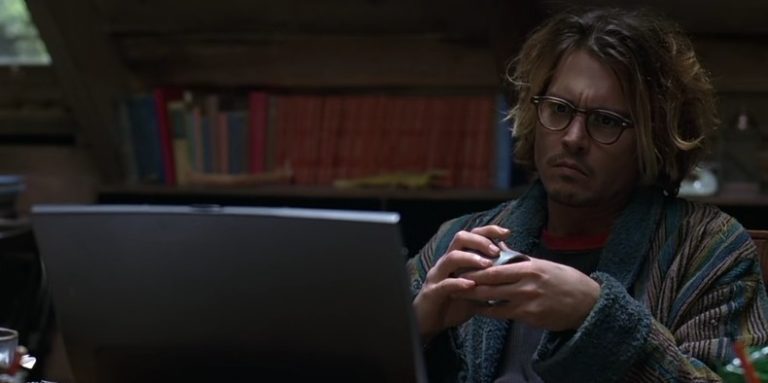
It's an all too familiar image for writers — cliche even. The frazzled hair. The defeated posture. The tired eyes. Sure signs of the writer's greatest fear — Writer's Block.
But what if I were to tell you that this fear is — for lack of a better term — bullshit? What if I were to tell you that writer's block is nothing more than a term that over-generalizes the multiple struggles that writer's face and must overcome while taking their stories from their own mind's eye to the page?
To conquer a problem, you must understand every dynamic of it. You must be able to identify each and every facet of this thing that is poisoning your writing process. Generalizing it with a single term does no writer any favor in overcoming it.

Here we detail seven simple explanations of what writer's block really is, and what solutions there are to stop every one.
1. It's Not Writer's Block, It's... Laziness.
You are told day in and day out that you need to be writing every day. While that isn't necessarily the case, you do need to be writing. Just calling yourself an author or screenwriter isn't enough. You actually have to have the content. And you can't have the content without what? Writing it.
But it takes effort to write. It takes effort to prepare. It takes effort to educate yourself in format, structure, and characterization. It takes effort to fail time and time again — until you slowly learn how to succeed based off of what you learned from those failures.
You can't do all of that if you're lazy. You can't do all of that if you choose to sleep, drink, eat, text, channel surf, or scroll on your phone endlessly. It's not writer's block. It's laziness.
Solution: Ask yourself this: Is this really what I want to do? Even more, is this what I need to do? If you experience any sort of indifference to either of those questions and treat writing as merely a ticket to fame and fortune (holding back laughter) or just a way to pass the time, writing isn't for you. There's no doubt you'll be lazy about it if that is the case. You need to truly want and need to write to get off of your lazy butt to do so.
2. It's Not Writer's Block, It's... Complacency.
The Cambridge English Dictionary best defines complacency as "a feeling of calm satisfaction with your own abilities or situation that prevents you from trying harder."
You're an action writer, so you write nothing but action. You're a melodramatic writer, so you write nothing but melodrama. You're a horror writer, so you write nothing but horror.
No wonder you're having problems figuring out what to write next and how to write it — you're bored. Been there, done that.
Stephen King was best known as the Master of Horror in the literary platform. He still is to many. However, some of his best writing can be found in the dramatic arena, with novels or novellas like The Body (later adapted to the big screen as Stand By Me) or Rita Hayworth and the Shawshank Redemption (later adapted to the big screen as The Shawshank Redemption).
There are only so many times you can do different variations of the same thing.
To keep yourself passionate about your writing, you have to challenge yourself. To challenge yourself, you have to step outside of your box and explore concepts and genres that are outside of your regular wheelhouse. It's okay to be great at one thing. It's even better to be amazing at many.
Solution: When considering your next screenplay or novel, try to find a subject, concept, or character that both intrigues and scares you. Or if that's too big of a step to start off on, try to meld those intriguing and intimidating elements with what you're good at already. Hollywood loves cross-genres.
3. It's Not Writer's Block, It's... Lack of Focus.
To focus on something is to make it the center of interest or activity. It's pretty difficult to focus when you have your iPhone in your hand more often than not. It's pretty difficult to focus when there's such a plethora of great content to take in as a consumer — movies, television, streaming content. With so many great shows and so many ways to binge watch them, well, that can surely affect your focus as a writer.
Or maybe it's your writing environment. If you're a parent trying to find any free moment to write in your house, you're likely distracted by kids, spouses, pets, house duties, etc. If you're writing in a coffee shop, you're probably distracted by people watching, conversations around you, coffee house music playlists ringing from the house speakers, and the result of being over-caffeinated.
When you can't focus in on your writing, you can't escape into that world you're trying to create.
Solution: Find the best writing sanctuary that best fits you. Some people may prefer to write at home. Some may prefer to write in coffee shops. Some may prefer to write in a silenced library room. Whatever suits you best as an individual works. Just make sure that wherever and whenever you write, you're allowing your screenplay or novel to be true center of interest and activity.
4. It's Not Writer's Block, It's... Lack of Preparation.
Inspiration can only take you so far. You need to do the work. You need to not only find the seed — the idea — but also nurture it. The concept must have story. The story must have characters. The characters must have goals. The goals must be challenged. Writers can't expect to sit down in front of the computer and blindly conjure all of those things and more.
The work of being a writer entails multiple elements of preparation, depending upon the process that each writer has. Some prosper more with details — character breakdowns, outlines, beat sheets, etc. Others prosper more with visualization — seeing the scene, sequence, or whole story through the mind's eye first before writing a single word. Or perhaps a hybrid of those two.
Regardless, when you're not prepared as you sit down to physically write, you'll surely find yourself drawing blanks.
Solution: Work to discover the best development process for you. Before you decide on a project, do the homework and see if it's really a project you want to tackle. Before you start developing the story, do the research. Before you sit down to write the script or book, know the general beginning, middle, and end — yet always leave room for discovery along the way. Before you get your fingers moving writing the scene or chapter, take some time to visualize it before you type.
5. It's Not Writer's Block, It's... Lack of Inspiration.
A great knight once said, "You must choose, but choose wisely."
Coming up with ideas is usually easy for the average writer. Coming up with inspired ideas is the true testament of a great writer.
But that's not as easy as it seems. Writers often find themselves sitting in silence and frustration trying to conjure the next brilliant concept. Some write endless loglines, searching for that one true gem. Others simply ask the many What If questions that can generate possible intriguing brainchildren. What usually happens is that the creative side of our brain is overwhelmed, like an over-worked processor handling multiples operations at one time.
Writers need to recognize those moments where their usually inspired imagination is caught in flux. When this happens, it's time to seek inspiration elsewhere.
Solution: When you are feeling uninspired, the best inspiration can come from reading books, watching television, reading the newspaper, going to the movies, listening to music, going for a walk/run/bike ride/car ride, or traveling. Inspiration doesn't always come to you. Sometimes you have to go find it.
6. It's Not Writer's Block, It's... Paralysis of Analysis.
Wikipedia defines it best as "the state of over-analyzing (or over-thinking) a situation so that a decision or action is never taken, in effect paralyzing the outcome."
You've done your research. You've read every book on the subject. You've written detailed notes. You've outlined every beat of the screenplay or novel. And yet you can't write a simple collective moment.
In the screenwriting world — and the literary as well I'm sure — there are so many books, classes, and seminars telling you to do it this way and that. To the point where you don't know who to believe and what process is right for you.
Clint Eastwood brought the notion of paralysis of analysis to the forefront of filmmaking when he told the story about the making of Flags Of Our Fathers, which Steven Spielberg produced and Eastwood directed.

Eastwood referenced Spielberg’s production of Saving Private Ryan, in which Spielberg shared that he decided against his normal storyboard process and instead created those now iconic opening battle sequences — complete with many different shots, angles, practical effects, and locations — on the day of shooting. Can you imagine? If you watch the opening of that film and see how complex, engaging, and brilliant those images were, it’s hard to believe that Spielberg made most of those decisions the day of. Eastwood utilized that style in Flags of Our Fathers and has ever since.
Rob Lorenz, one of Eastwood’s regular collaborators, stated in an interview with the Director’s Guild of America, "Analysis Paralysis means you go from the gut. That’s one of the reasons he likes the first take so much, it’s got that spontaneity."
Cinematographer Tom Stern reiterates, "Clint has [that paralysis of analysis] expression that he whips on me a lot because I have too many advanced degrees and it’s gotten down to a kind of look he gives me over his nose when I start being analytical... He doesn’t want to do that. He’s spontaneous or improvisational. It’s his spirit. He’s very, very intuitive."
Over-thinking your stories and characters can shut down the creative side of your brain by over-utilizing the analytical side. We've seen proof recently that computers and algorithms lack the ability to conjure creative writing. They can't even manage to articulate inspiring quotes.

Your analytical self can only offer so much. It can only work as a tool to gather your creative creations, not create them. When you overthink everything, you can't discover anything. You leave no room for discovery.
Solution: Never allow yourself to know your story from Point A to Point Z and every point in between. You don't need to be versed in every little element of your subject, concept, story, genre, world, or character. You just need to know enough to tell your story the best possible way you can.
7. It's Not Writer's Block, It's An Excuse.
It's here that we cover the hard truth with some tough love. When writers blame writer's block on their writer's woes, it's an easy excuse for them not to explore the reasons why they can't write.
"Oh, it's just writer's block, it'll pass."
Six months? A year? When exactly will this "writer's block" pass? Or is it less about some over-generalized cloud hanging over a writer's head and more about them not having the courage and determination to pinpoint the reasons behind their lack of production?
Solution: Don't call the problem by that name. Instead, investigate whether your problem is truly laziness, complacency, lack of focus, lack of preparation, lack of inspiration, paralysis of analysis, or just an excuse to not do the work — or a combination of any of those and more.
Once you figure that out and find some solutions?

Ken Miyamoto has worked in the film industry for nearly two decades, most notably as a studio liaison for Sony Studios and then as a script reader and story analyst for Sony Pictures.
He has many studio meetings under his belt as a produced screenwriter, meeting with the likes of Sony, Dreamworks, Universal, Disney, Warner Brothers, as well as many production and management companies. He has had a previous development deal with Lionsgate, as well as multiple writing assignments, including the produced miniseries Blackout, starring Anne Heche, Sean Patrick Flanery, Billy Zane, James Brolin, Haylie Duff, Brian Bloom, Eric La Salle, and Bruce Boxleitner. Follow Ken on Twitter @KenMovies
For all the latest ScreenCraft news and updates, follow us on Twitter, Facebook, and Instagram.
Tags
Get Our Screenwriting Newsletter!
Get weekly writing inspiration delivered to your inbox - including industry news, popular articles, and more!

























